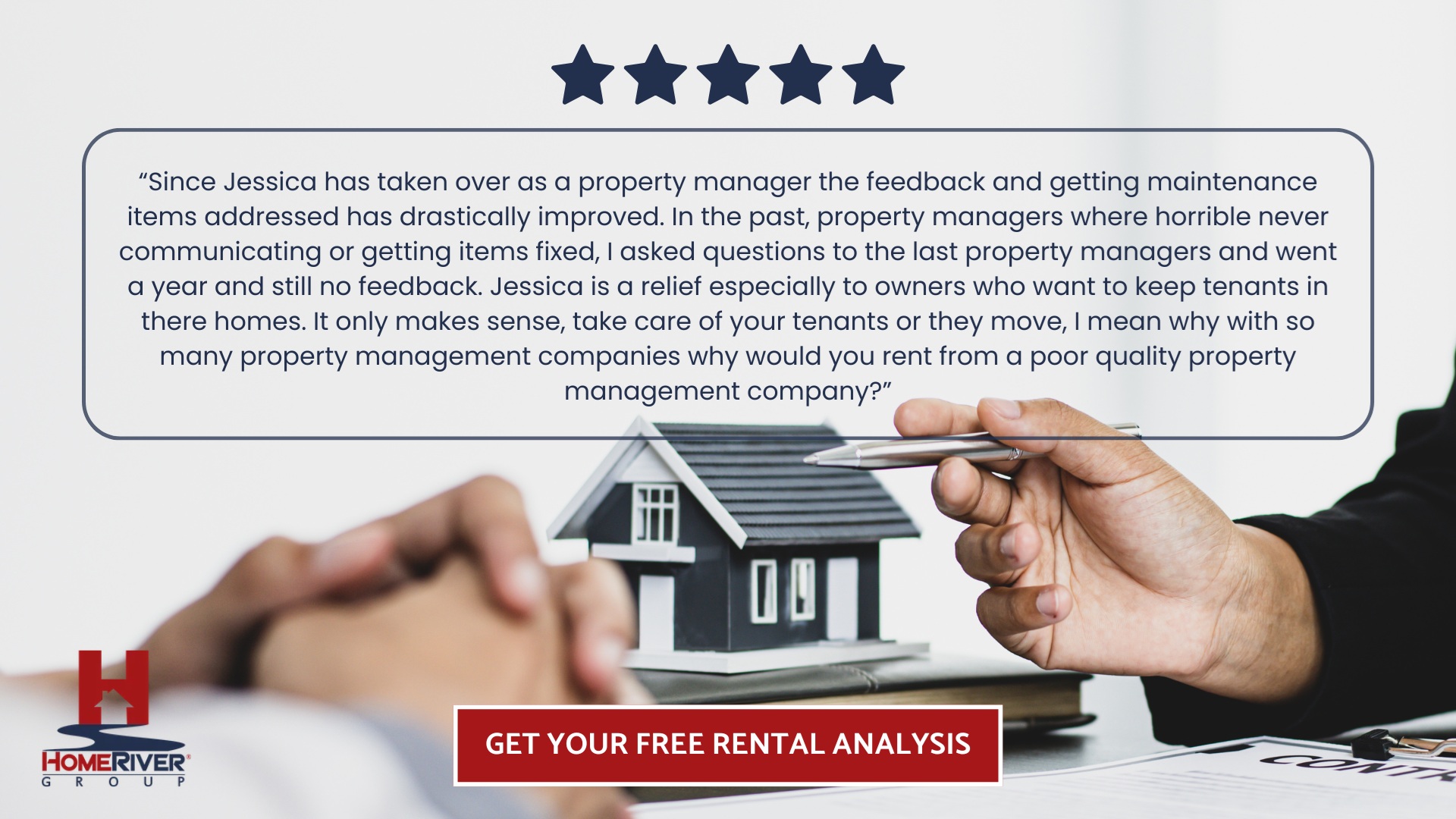
For expert guidance in finding your ideal rental property, HomeRiver Group stands at the forefront. Our unmatched local expertise, commitment to client satisfaction, and deep understanding of market trends make us the go-to choice for renters. We streamline the rental process, making it seamless and stress-free so you can focus on what matters most—finding a place that truly feels like home.
The decision between renting and buying a home is one of many individuals' most significant financial choices. With the real estate landscape constantly evolving, the advantages and considerations of each option have also shifted. Given each person's diverse needs and circumstances, there's no one-size-fits-all answer to whether renting a home is better than buying one.
This article will explore the key reasons why some people choose to rent a home rather than buy, examining the financial, lifestyle, and market-driven factors that influence this decision. By understanding the benefits and considerations of renting, you'll gain insight into whether it might be the right option for your current needs and long-term goals.
Understanding Renting vs. Buying
When faced with where to live, renting vs. buying is often at the forefront of potential home dwellers' minds. This choice is not merely financial; it reflects lifestyle preferences, career mobility, and personal circumstances. Understanding why one might rent a home rather than buy provides valuable insight into this significant life decision.
Prioritizing Mobility: Renting For A Dynamic Lifestyle
Renting offers flexibility and freedom from many long-term commitments and responsibilities associated with homeownership. For individuals or families who prioritize mobility due to career changes, educational pursuits, or simply a desire for a change of scenery, renting can be the most sensible option. The ability to relocate without the burden of selling a property provides a level of adaptability that aligns well with the needs of those with dynamic lifestyles or uncertain long-term plans.
Financial Predictability: The Cost Advantages Of Renting
Renting reduces many of the financial responsibilities that come with owning a home. Property maintenance, repairs, and improvements—along with their associated costs—are typically the landlord's responsibility. This arrangement can be particularly appealing for those who prefer a predictable monthly expense without the additional financial contingencies that homeownership can entail. For individuals and families working within a strict budget or those who wish to avoid the unpredictability of home repair costs, renting can offer a more stable and concern-free living situation.
Building Equity And Stability: The Appeal Of Homeownership
Buying a home is often seen as an investment in one's future. It offers the promise of property value appreciation and the opportunity to build equity over time. Additionally, homeownership provides a sense of permanence and stability, allowing for greater personalization of the living space. Despite these advantages, the initial financial barriers to homeownership—such as the down payment, closing costs, and other associated expenses—can be prohibitive for many.
The Financial Side Of Renting
When deliberating why people might choose to rent rather than buy a home, the financial implications that significantly influence this decision must not be overlooked.
Flexibility Without The Commitment
Renting a home requires less upfront investment than buying. While purchasing a property often necessitates a sizeable down payment, typically around 20% of the home's value, renting primarily requires a security deposit and the first month's rent. This reduced initial expense enables individuals to allocate their savings towards other investments or financial goals, providing flexibility that owning cannot match. For those prioritizing financial fluidity over homeownership, renting offers a path with fewer financial hurdles.
Avoiding Additional Homeownership Costs
Renting circumvents the myriad of ongoing costs associated with homeownership. Property taxes, homeowner's insurance, maintenance expenses, and repair costs can significantly burden homeowners. Renters, conversely, are generally not directly responsible for these expenses, as they are typically covered by the landlord or property management company, such as HomeRiver Group.
No Risk Of Property Depreciation
Another financial benefit of renting is the absence of risk related to property depreciation. In volatile or declining real estate markets, homeowners can find themselves in a situation where their property's value decreases, potentially leading to financial loss if they decide to sell. Renters are shielded from this risk, ensuring that their living situation is not directly tied to the real estate market fluctuations.
Financial Mobility And Opportunity Cost
Renting also affords financial mobility that buying cannot. Selling a home, including agent commissions and closing costs, can be significant. Homeownership is less ideal for those who anticipate moving frequently for work or personal reasons. Additionally, the opportunity cost of having a large portion of one's capital tied up in a home rather than invested in potentially higher-yield opportunities cannot be ignored.
Rental Commitment: Pros And Cons
The decision to rent or buy a home is significantly influenced by personal, professional, and financial factors. As we explore why some people might choose to rent rather than buy one, it's vital to understand the commitments, advantages, and limitations of renting.
Pros Of Renting
Flexibility: One of the key advantages of renting is its flexibility. Renters can choose short-term leases, which allow them to relocate quickly for job opportunities, lifestyle changes, or personal preferences without the burden of selling a property.
Lower Upfront Costs: Renting typically requires less money upfront than the down payment needed to purchase a home, making it more accessible for individuals with limited savings.
Maintenance and Repair Responsibilities: Generally, landlords are responsible for maintenance and repairs, relieving renters from the financial and logistical burdens of property upkeep. This can lead to significant savings and less personal time invested in property management.
Amenities: Many rental properties offer amenities such as fitness centers, pools, and community spaces that might be cost-prohibitive for a homeowner.
No Depreciation Risk: Renters are not financially impacted by property value fluctuations, protecting them from real estate market downturns that could affect homeowners.
Cons Of Renting
Lack Of Equity Building: Unlike homeowners, renters do not build equity in a property over time, which means they miss out on the potential financial benefits of property ownership.
Rental Increases: Depending on the market and lease terms, renters may face unpredictable rent increases, which can impose financial strain and make long-term budgeting challenging.
Limited Personalization: Rental agreements often restrict property modifications, limiting how much renters can personalize their living spaces to reflect their style and needs.
Instability: At the end of each lease term, renters may face uncertainty, possibly having to move if the landlord decides not to renew the lease or if the rental property is sold.
No Tax Advantages: Homeowners often benefit from tax deductions such as mortgage interest and property taxes, which are unavailable to renters.
Maintenance Responsibilities: Rent vs. Own
When deliberating why some people might choose to rent a home rather than buy, it's essential to understand the differing responsibilities, especially concerning maintenance and repairs. This aspect of homeownership versus renting plays a significant role in influencing one's decision.
Renting
For renters, the landlord or property management company, such as HomeRiver Group, which offers competitive pricing plans for comprehensive services, typically handles major maintenance problems and repairs. This includes but is not limited to fixing broken appliances, addressing plumbing issues, and ensuring the property meets habitational standards. Renters enjoy a more hands-off living situation without worrying about unexpected repair costs or needing to manage property upkeep personally.
Owning
On the contrary, homeowners are responsible for their property's maintenance and repairs. While this allows for greater control over one's living situation and the ability to customize the property to one's taste, it comes with the burden of either doing the work personally or hiring professionals. Unexpected expenses, such as roof repairs, HVAC system replacements, or plumbing issues, can sometimes arise and require substantial out-of-pocket costs. For many, the financial and time commitments associated with maintaining a home are significant factors leading them to opt for renting over buying.
The Role Of Market Conditions In Housing Decisions
When evaluating why individuals might choose to rent a home rather than buy, it is crucial to consider the substantial impact of market conditions on housing decisions. The fluctuating nature of the real estate market often dictates the availability of properties and their affordability.
High Property Prices
In times of soaring property prices, the upfront cost of purchasing a home – including the down payment, closing costs, and other associated fees – can become prohibitively expensive for many potential buyers. This situation may lead individuals to choose renting as a more financially feasible option. Renting offers the flexibility to live in desired locations without the high initial costs of buying a property. Moreover, in a seller's market, where demand outstrips supply, finding a home to buy can be highly competitive and stressful, pushing more individuals toward the rental market.
Buyer’s Markets
Conversely, in a buyer's market, where supply exceeds demand, individuals might find enticing opportunities to purchase homes at lower prices or with more favorable terms. However, even in such conditions, the desire or necessity to remain mobile for job opportunities, the avoidance of maintenance responsibilities, or the lack of readiness for homeownership's long-term commitment might still lead someone to rent instead of buy.
The Influence of Interest Rates on Renting vs. Buying
Interest rates play a critical role in housing decisions. Lower interest rates can make mortgage payments more affordable, potentially tipping the scales in favor of buying for those on the fence. On the other hand, when interest rates are high, securing a mortgage becomes costlier, potentially making renting a more attractive option.
Final Thoughts
Ultimately, choosing between renting and buying a home depends on individual circumstances, financial goals, and lifestyle preferences. Renting offers flexibility, minimal maintenance responsibilities, and the opportunity to live in prime locations without the substantial commitment of buying. It caters to those whose careers or personal lives require mobility or who are not yet ready to undertake the financial responsibilities of homeownership. On the other hand, buying a home can be a path to building equity, with long-term financial and emotional benefits.
At HomeRiver Group, we understand the importance of making the right choice for your housing needs. With our exceptional service, local expertise, and nationwide presence, we aim to guide you through every step of your journey, whether you're leaning towards renting or buying. We believe your property or future home is our priority, and our comprehensive suite of property management services ensures that whether you decide to rent or buy, your experience is seamless and tailored to your unique situation.
Whether you choose the flexibility of renting or the permanence of buying, making an informed decision that aligns with your personal and financial goals is crucial.
Read also:
Property Management Company: What Are Typical Rental Application Fees?
Short-Term Rentals vs. Long-Term Rentals: A Comprehensive Comparison
Frequently Asked Questions About Why Might People Choose To Rent A Home Rather Than Buy A Home
What are the financial benefits of renting a home?
Renting avoids high upfront costs like down payments and closing fees; maintenance is typically the landlord’s responsibility. This leads to more predictable expenses—ideal for budgeting or saving.
What are the upfront costs of renting vs. buying?
Renting usually requires a security deposit and one or two months’ rent, while buying involves a down payment (3.5%-20%), closing costs, and fees, which can be substantial.
Why might renting be more convenient than buying?
Renting avoids long-term mortgage commitments and allows easier relocation. Property management often handles repairs, adding to the convenience.
How do maintenance responsibilities differ between renting and buying?
Renters rely on the landlord or property manager for major repairs, while homeowners cover all maintenance costs, which can be costly and time-consuming.
What is the impact of real estate market fluctuations on renters vs. buyers?
Market changes impact renters less, as they commit only to their lease term. Homeowners’ property values fluctuate with the market, affecting net worth and resale value.
How does renting provide flexibility compared to owning?
Renting allows easy relocation at the lease end without selling a property, which is ideal for those with changing jobs, lifestyle needs, or preferences.
How does renting affect one's ability to build equity?
Renting doesn’t build equity like homeownership. Homeowners gain value as they pay off their mortgage and property values grow, while renters need other investment strategies.










